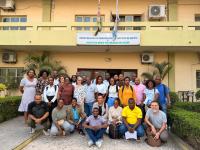ILO calls for fundamental changes in health at work
 The ILO Global Commission on the Future of Work calls for fundamental changes in the way we work in the new wave of globalization, rapid technological development, demographic transition and climate change, according to its report Work for a Brighter Future, published on January 22. The report examines how to achieve a better future of work for all at a time of unprecedented change and exceptional challenges in the world of work.
The ILO Global Commission on the Future of Work calls for fundamental changes in the way we work in the new wave of globalization, rapid technological development, demographic transition and climate change, according to its report Work for a Brighter Future, published on January 22. The report examines how to achieve a better future of work for all at a time of unprecedented change and exceptional challenges in the world of work.
Health higher on the work agenda
These changes require placing health higher on the agenda of the world of work. Everybody has the right to health, which is defined by WHO as a state of complete physical and mental wellbeing and not only the absence of disease and infirmity. Working people have also the right to health and to healthcare as close as possible to where they live and work.
Healthier and safer workplaces can prevent at least 1,2 million deaths every year, according to a 2018 WHO study 1. “Much more deaths and disability can be prevented through addressing major health threats at the workplace, such as stress, long working hours and shift, sedentary work, climate sensitive diseases and workplace air pollution”, said Dr Maria Neira, WHO Director for Public Health, Environmental and Social Determinants of Health. “The workplace is a key setting for action in many WHO initiatives on environment and climate change, non-communicable diseases, mental health, tuberculosis, HIV and other communicable diseases.”
“We share the interest of the Global Commission about the possible mental health effects of new technologies and work organization in the digital economy and we are eager to collaborate with ILO to develop recommendations for improving mental health at the workplace”, said Dr. Dévora Kestel, WHO Director for Mental Health and Substance Abuse.
Health coverage to one billion more working people
WHO welcomes the recommendation of the Global Commission to establish a Universal Labour Guarantee that includes a set of basic working conditions, such as adequate living wage, limits on hours of work and safe and healthy workplaces. Fair employment and decent working conditions are powerful determinant of health.
WHO is working with countries to extend universal health coverage to 1 billion more people, as well as the most basic interventions and services for safer and healthier workplaces for workers in all forms of employment, including in the informal economy, migrant workers and digital platforms. It is at the workplace where the Universal Health Coverage and the Universal Labour Guarantee can make a visible difference in the daily life of working people and their facilities. WHO is committed to work with ILO to make this happen.
In 2018, WHO and ILO established a global coalition on occupational safety and health as multi-partner initiative of international and national agencies to create common solutions for the challenges for health and safety at work and to stimulate joint actions by health and labour sectors in countries.
WHO furthermore welcomes the attention given by the Global Commission on the care economy and healthcare is a major part of it. WHO is working with ILO and OECD to implement the five-year ‘Working for Health’ 2 global action plan to create new and decent job opportunities in health care, thus ensuring the necessary workforce for universal health coverage and stimulating economic growth. “Decent work in the health sector requires healthy and safe workplaces in all healthcare facilities for all health workers, everywhere – from hospitals to primary care, in cities, villages and fragile settings, and anytime – in the daily work, and in public health emergencies “, said Mr Jim Campbell, Director of WHO Department for Health Workforce.



